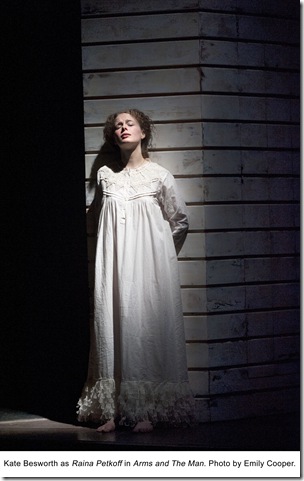Shaw Festival’s production of Arms and the Man: The 2014 Season Opens with a Winner
Kate Besworth as Raine Petkoff. Photo by Emily Cooper
NIAGARA-ON-THE-LAKE, Ont. —The Shaw Festival’s latest production of Arms And The Man is definitely pint-sized — a shorter version with at least 30 minutes of its normal running time chopped out.
Purists, who relish the play’s philosophical musings about the absurdities of militarism and the follies of romantic illusion, may well take offence at being short-changed in this way — seeing the 2014 season’s opening show less as an act of streamlining than as an act of dumbing-down: in other words, let’s just laugh and enjoy the liveliness of character and situation — but for heaven’s sake, let’s not be forced to think too hard about what’s really on playwright Bernard Shaw’s mind.
But let’s keep things in perspective. The Shaw Festival may be the only organization in the world dedicated to the theatre of Bernard Shaw and his contemporaries, but it’s never been the kind of sacred shrine that treats the master’s works like holy writ. There’s also an important place at Niagara for exploration and experimentation — witness the audacity with which it has revisited Saint Joan over the years — and that’s one of the happiest aspects of the festival’s mandate.
So spare some indulgence for director Maurice Panych for his decision to explore — in his own words “the idea of kitsch, of over-the-top romanticism” in the revival that made such a merry landing at the Royal George Theatre last week. Surely, after five previous festival productions, a bit of cheekiness can be tolerated.
Designer Ken MacDonald, Panych’s longtime creative accomplice, gives us a Petkoff family home that offers an excess of dubious taste — an expanse of latticework topped by a monstrous stag’s head and crossed muskets, a curlicued four-poster bed so ornate that it’s the perfect complement to daughter Raina’s romantic nonsense, ridiculously coiffured trees, an improbably blue sky in the background. It’s a perfect venue for make-believe and self-deception — and we get plenty of that — yet it’s not all artifice. It’s also a home, a believable one, and real people inhabit it even though they often behave like nitwits.
Raina, the daughter of the house, is in her early twenties, but as portrayed by an exuberant Kate Besworth, she’s behaving like the giddiest of adolescent romantics, consumed by fantasies of stalwart bravery in the field, and particularly by the exploits of the mustachioed Major Sergius Saranoff, her self-regarding husband to be. But when an enemy Swiss mercenary, Captain Bluntschli (a convincing, likeable characterization from Graeme Somerville) breaks into her boudoir, her illusions are shattered. She, the starry-eyed worshipper of all things military, is horrified by Bluntschli’s matter-of-fact admission that he’s quite capable of cowardice if it means saving his own skin, and by the fact that he stores chocolate in the pockets of his uniform rather than extra bullets.
Need we add that in the midst of all the surrounding unrest — both outside the Petroff house where the sounds of battle periodically surface, and within Raina’s own turbulent heart — some sort of chemistry is asserting itself. It may be a peculiarly Shavian chemistry but it’s there and it’s rewarding to see these two accomplished performers lay down the markers.
This is supposed to be happening in the midst of an obscure conflict — the Serbo-Bulgarian war of 1885-86 — but as critic William Archer mischievously remarked back in 1894, the play’s characters would have been equally at home “in that romantic valley which nestles between the cloud-capped summits of Hampstead and Sydenham.”
It’s not so much that Panych blunts the satirical barbs, as that he softens them. The humor is freewheeling, the characters neatly defined. And there’s some scampering background music from composer Ryan deSouza whose impish imagination suggests that he would be equally at home providing accompaniment for the silent movie comedies of the Keystone Kops.
But funny as this production can be, the comedy is not totally at the expense of the people who inhabit this sometimes cuckoo world. Consider Martin Happer’s performance as Sergius, Raina’s proud and somewhat preening suitor. It’s possible to portray Sergius as an absolute blockhead — a strutting, preening ass of the first order — and get huge laughs. Happer goes a different route. There’s no denying his ludicrous aspects, but here his bravery seems less of a joke, and his emotional vulnerability seems real. Hence, his scenes with the formidable servant Louka, portrayed here with tough-minded humor by Claire Jullien, have an emotional substance not always evident in productions of this play.
Norman Browning, has played Major Petkoff before, and in this latest outing he invests the character of Raina’s father with a dotty, crotchety charm. Laurie Paton’s excellent Catherine Petkoff is the kind of wife who has seen it all, and Peter Krantz makes every one of his scenes count as a hapless, much-put-upon servant.
In brief, less bite than we might expect from Arms And The Man. But also a warmer heart. This is a genuinely funny and affectionate revival.
(Arms And The Man runs to Oct. 18. Tickets at 1 800 511 7429 or shawfest.com)
